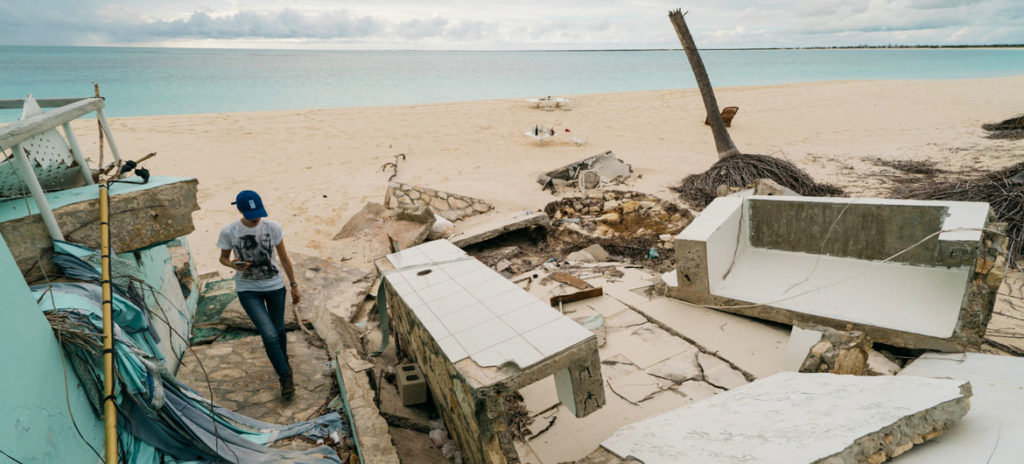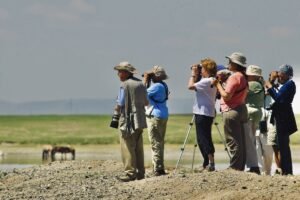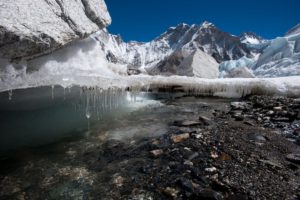Global warming ‘unequivocally’ human driven, at unprecedented rate: IPCC

Climate change is widespread, rapid, and intensifying, and some trends are now irreversible, at least during the present time frame, according to the latest much-anticipated Intergovernmental Panel on Climate Change (IPCC) report, released on August 9 , 2021.
Human-induced climate change is already affecting many weather and climate extremes in every region across the globe. Scientists are also observing changes across the whole of Earth’s climate system; in the atmosphere, in the oceans, ice floes, and on land.
Many of these changes are unprecedented, and some of the shifts are in motion now, while some – such as continued sea level rise – are already ‘irreversible’ for centuries to millennia, ahead, the report warns.
But there is still time to limit climate change, IPCC experts say. Strong and sustained reductions in emissions of carbon dioxide (CO2) and other greenhouse gases, could quickly make air quality better, and in 20 to 30 years global temperatures could stabilize.
‘Code red for humanity’
The UN Secretary-General António Guterres said the Working Group’s report was nothing less than “a code red for humanity. The alarm bells are deafening, and the evidence is irrefutable”.
He noted that the internationally-agreed threshold of 1.5 degrees above pre-industrial levels of global heating was “perilously close. We are at imminent risk of hitting 1.5 degrees in the near term. The only way to prevent exceeding this threshold, is by urgently stepping up our efforts, and persuing the most ambitious path. “We must act decisively now, to keep 1.5 alive.”
The UN chief in a detailed reaction to the report, said that solutions were clear. “Inclusive and green economies, prosperity, cleaner air and better health are possible for all, if we respond to this crisis with solidarity and courage”, he said.
He added that ahead of the crucial COP26 climate conference in Glasgow in November, all nations – especiall the advanced G20 economies – needed to join the net zero emissions coaltion, and reinforce their promises on slowing down and reversing global heating, “with credible, concrete, and enhanced Nationally Determined Contributions (NDCs)” that lay out detailed steps.
The report, prepared by 234 scientists from 66 countries, highlights that human influence has warmed the climate at a rate that is unprecedented in at least the last 2,000 years.
In 2019, atmospheric CO2 concentrations were higher than at any time in at least 2 million years, and concentrations of methane and nitrous oxide were higher than at any time in the last 800,000 years.
Global surface temperature has increased faster since 1970 than in any other 50-year period over a least the last 2,000 years. For example, temperatures during the most recent decade (2011–2020) exceed those of the most recent multi-century warm period, around 6,500 years ago, the report indicates.
Meanwhile, global mean sea level has risen faster since 1900, than over any preceding century in at least the last 3,000 years.
The document shows that emissions of greenhouse gases from human activities are responsible for approximately 1.1°C of warming between 1850-1900, and finds that averaged over the next 20 years, global temperature is expected to reach or exceed 1.5°C of heating.
The IPCC scientists warn global warming of 2°C will be exceeded during the 21st century. Unless rapid and deep reductions in CO2 and other greenhouse gas emissions occur in the coming decades, achieving the goals of the 2015 Paris Agreement “will be beyond reach”.
The assessment is based on improved data on historical warming, as well as progress in scientific understanding of the response of the climate system to human-caused emissions.
“It has been clear for decades that the Earth’s climate is changing, and the role of human influence on the climate system is undisputed,” said IPCC Working Group I Co-Chair, Valérie Masson-Delmotte. “Yet the new report also reflects major advances in the science of attribution – understanding the role of climate change in intensifying specific weather and climate events”.
The experts reveal that human activities affect all major climate system components, with some responding over decades and others over centuries.
Scientists also point out that evidence of observed changes in extremes such as heatwaves, heavy precipitation, droughts, and tropical cyclones, and their attribution to human influence, has strengthened. They add that many changes in the climate system become larger in direct relation to increasing global warming.
This includes increases in the frequency and intensity of heat extremes, marine heatwaves, and heavy precipitation; agricultural and ecological droughts in some regions; the proportion of intense tropical cyclones; as well as reductions in Arctic sea ice, snow cover and permafrost.
The report makes clear that while natural drivers will modulate human-caused changes, especially at regional levels and in the near term, they will have little effect on long-term global warming.
The IPCC experts project that in the coming decades climate changes will increase in all regions. For 1.5°C of global warming, there will be increasing heat waves, longer warm seasons and shorter cold seasons.
At 2°C of global warming, heat extremes are more likely to reach critical tolerance thresholds for agriculture and health.
But it won’t be just about temperature. For example, climate change is intensifying the natural production of water – the water cycle. This brings more intense rainfall and associated flooding, as well as more intense drought in many regions.
It is also affecting rainfall patterns. In high latitudes, precipitation is likely to increase, while it is projected to decrease over large parts of the subtropics. Changes to monsoon rain patterns are expected, which will vary by region, the report warns.
Moreover, coastal areas will see continued sea level rise throughout the 21st century, contributing to more frequent and severe coastal flooding in low-lying areas and coastal erosion.
Extreme sea level events that previously occurred once in 100 years could happen every year by the end of this century.
The report also indicates that further warming will amplify permafrost thawing, and the loss of seasonal snow cover, melting of glaciers and ice sheets, and loss of summer Arctic sea ice.
Changes to the ocean, including warming, more frequent marine heatwaves, ocean acidification, and reduced oxygen levels, affect both ocean ecosystems and the people that rely on them, and they will continue throughout at least the rest of this century.
Experts warn that for cities, some aspects of climate change may be magnified, including heat, flooding from heavy precipitation events and sea level rise in coastal cities.
Furthermore, IPCC scientists caution that low-likelihood outcomes, such as ice sheet collapse or abrupt ocean circulation changes, cannot be ruled out.
“Stabilizing the climate will require strong, rapid, and sustained reductions in greenhouse gas emissions, and reaching net zero CO2 emissions. Limiting other greenhouse gases and air pollutants, especially methane, could have benefits both for health and the climate,” highlights IPCC Working Group I Co-Chair Panmao Zhai.
The report explains that from a physical science perspective, limiting human-induced global warming to a specific level requires limiting cumulative carbon dioxide emissions, reaching at least net zero CO2 emissions, along with strong reductions in other greenhouse gas emissions.
“Strong, rapid and sustained reductions in methane emissions would also limit the warming effect resulting from declining aerosol pollution”, IPCC scientists underscore.
(The Intergovernmental Panel on Climate Change (IPCC) is the UN body for assessing the science related to climate change. It was established by the United Nations Environment Programme (UNEP) and the World Meteorological Organization (WMO) in 1988 to provide political leaders with periodic scientific assessments concerning climate change, its implications and risks, as well as to put forward adaptation and mitigation strategies.
In the same year the UN General Assembly endorsed the action by the WMO and UNEP in jointly establishing the IPCC. It has 195 member states. Thousands of people from all over the world contribute to the work of the IPCC. For the assessment reports, IPCC scientists volunteer their time to assess the thousands of scientific papers published each year to provide a comprehensive summary of what is known about the drivers of climate change, its impacts and future risks, and how adaptation and mitigation can reduce those risks. )
Image : The aftermath of Hurricane Irma in Barbuda.UNDP/Michael Atwood
Aug. 9 , 2021














